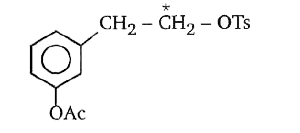Common product formed due to the activity of transketolase enzyme during C3 cycle
Ribulose - 5 - phosphate
Ribose - 5 - phosphate
Xylulose - 5 - phosphate
Fructose - 5 - phosphate
The correct Answer is:C
Step-by-Step Solution
1. Understanding the C3 Cycle: The C3 cycle, also known as the Calvin cycle, is a series of biochemical reactions that take place in the chloroplasts of photosynthetic organisms. It is responsible for fixing carbon dioxide and synthesizing glucose.
2. Role of Transketolase: Transketolase is an enzyme that plays a crucial role in the C3 cycle. It catalyzes the transfer of two-carbon units (ketolase activity) between sugars, which is essential for the regeneration of ribulose bisphosphate (RuBP).
3. Identifying the Substrates: During the regeneration phase, transketolase acts on fructose 6-phosphate (F6P) and glyceraldehyde 3-phosphate (G3P). The enzyme facilitates the conversion of these substrates into different sugar phosphates.
4. Formation of Erythrose 4-Phosphate: When transketolase acts on fructose 6-phosphate, it removes two carbons, resulting in the formation of erythrose 4-phosphate. This is a key intermediate in the cycle.
5. Formation of Xylulose 5-Phosphate: The two-carbon units that are removed from fructose 6-phosphate are then added to glyceraldehyde 3-phosphate, leading to the formation of xylulose 5-phosphate.
6. Conclusion: Therefore, the common product formed due to the activity of the transketolase enzyme during the C3 cycle is xylulose 5-phosphate.
Final Answer
The common product formed due to the activity of transketolase enzyme during the C3 cycle is xylulose 5-phosphate.
---
The common product formed due to the activity of transketolase enzyme during the C3 cycle is xylulose 5-phosphate.
Topper's Solved these Questions
- PHOTOSYNTHESIS IN HIGHER PLANTS BOOK - AAKASH SERIESCHAPTER - PHOTOSYNTHESIS IN HIGHER PLANTS EXERCISE - Exercise - II
33 Videos
- PHOTOSYNTHESIS IN HIGHER PLANTS BOOK - AAKASH SERIESCHAPTER - PHOTOSYNTHESIS IN HIGHER PLANTS EXERCISE - Exercise - III
27 Videos
- ORGANISMS AND POPULATIONSBOOK - AAKASH SERIESCHAPTER - ORGANISMS AND POPULATIONSEXERCISE - EXERCISE-III (PREVIOUS AIPMT/NEET QUESTIONS)
35 Videos
- PLANT GROWTH AND DEVELOPMENT BOOK - AAKASH SERIESCHAPTER - PLANT GROWTH AND DEVELOPMENT EXERCISE - EXERCISE -III (PREVIOUS AIPMT/NEET QUESTIONS)
27 Videos
Similar Questions
Knowledge Check
Growth rings are formed due to activity of
Aextrastellar cambiumBintrastellar cambiumCinterstellar cambiumDboth (ii) and (i)Product(s) formed during this reaction is/are :
 A
A B
B C
C Dboth (a) and (b)
Dboth (a) and (b)
Annual growth rings are formed due to activity
View SolutionThe enzymes for thet condensation of trioses during Calvin cycle is
View SolutionActive site of an enzyme is formed of
View SolutionName the by-products formed during the oxidation of food.
View SolutionFibrin is formed from fibrinogen due to activity of
View SolutionMost common mineral activator of glycolytic enzymes is
View Solution
